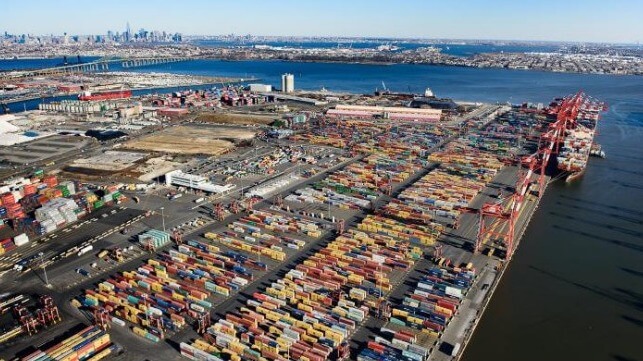Supreme Court Ends Famed Commission Fighting NY/NJ Port Corruption

The Supreme Court of the United States released its opinion today that clears the way for the end of the Waterfront Commission of New York Harbor which has overseen port operations and fought corruption since the 1950s. At issue was New Jersey’s decision to unilaterally withdraw from the commission despite the consistent opposition from its partner on the commission New York State. The decision is seen as a victory for the unions which argued the commission structure was an impediment to efficient operations.
The dispute between the two states had been ongoing for the past five years since New Jersey lawmakers voted in 2018 to end their participation in the commission. The original compact entered into by the two states in 1953 to form the commission did not address each state’s power to withdraw from the compact, with New York arguing that it had to be by mutual consent. The case had gone through a series of decisions in the lower courts before the Supreme Court agreed to hear the case as part of the court’s original mandate to resolve disputes between states.
The commission, which was equally managed by the two states, was established in response to the long history of corruption and organized crime in New York Harbor. The problems of the port famously became the backdrop for a 1950s movie “One the Waterfront,” and remained a center of attention.
“As the decades have, passed the circumstances at the port have changed,” says the opinion authored by Justice Brett Kavanaugh and supported in a nine-to-nothing vote by the justices. They highlight that in 1953, roughly 70 percent of waterfront employees worked on the New York side of the port. By 2018, however, it had evolved according to New Jersey that more than 80 percent of work hours occur in New Jersey with 80 percent of the cargo handled by terminals in New Jersey.
New Jersey justified its decision to end the commission saying that it believes the commission was “ill-equipped to handle 21st-century security challenges. They also supported the union's position that the port is over regulated and as such it impedes job growth and efficiency. New York argued that beyond the need to have an agreement to end the commission, the commission continued to play a vital role in the oversight of the operations and helping to keep organized crime out of the port.
In the nine-page opinion, Justice Kavanaugh highlights that both states recognized the fact that the commission was never intended to operate forever. Neither side disputed that during the arguments. The court says the issue comes down to the understanding when the two states entered into the compact and points to the principles of contract law. They believe the absence of specific language in the compact points to a belief that either state may unilaterally withdraw. Contract law the opinion states provided in 1953 and still today that a contract can be terminated at will by either side. The decision further highlights the principles of state sovereignty, which in the opinion of the court also support New Jersey’s position.
The court says that New York’s arguments that the “compact should be read to prohibit unilateral withdrawal are unpersuasive.” New York highlighted other examples of pre-1953 compacts that while also silent on withdrawal were understood to forbid it. Kavanaugh’s opinion says that those cases concerned issues of boundaries and water-rights allocation that are not governed by the default contract-law rule. New York also sought to use international treaty law, past practices in similar compact disputes, and the potential for sweeping consequences to support its arguments.
New York Governor Kathy Hochul and Attorney General Letitia James responded to the court’s decision by saying, “We are disappointed by the Supreme Court's decision to allow New Jersey to unilaterally withdraw from the Waterfront Commission. For decades, the Waterfront Commission has been a vital law enforcement agency, protecting essential industries at the port and cracking down on organized crime. We will continue to do everything in our power to combat corruption and crime, protect the health of our economy, and ensure the safety of New Yorkers.”

that matters most
Get the latest maritime news delivered to your inbox daily.
New Jersey Governor Phil Murphy in a written statement after the opinion was released says "I am thrilled that the United States Supreme Court has unanimously ruled that New Jersey has the right to withdraw from the Waterfront Commission…. For many years, frustration over the Commission’s operations has been building. I am proud that after a five-year battle in the federal courts, where my Administration used every legal tool at our disposal, New Jersey’s sovereign right to govern our ports has been vindicated.”
New Jersey plans to transition the Waterfront Commission’s law enforcement and regulatory responsibilities to the New Jersey State Police.
